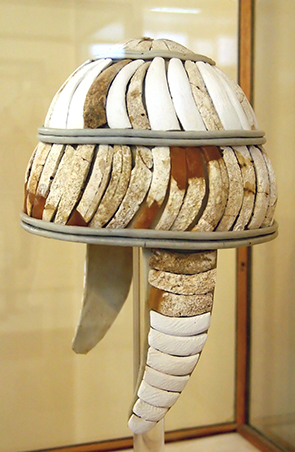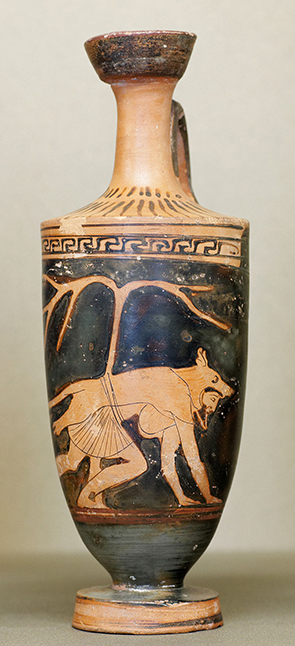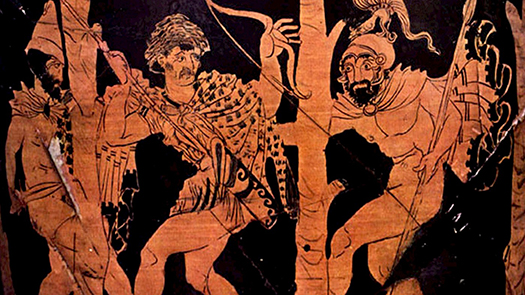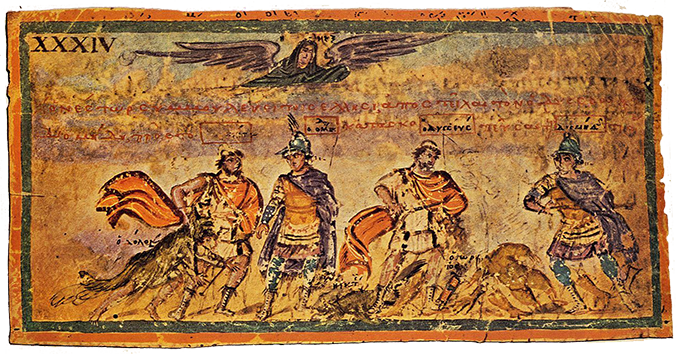

As Book 10 begins Agamemnon is unable to sleep, haunted by the Trojan campfires on the plain, surrounding the Achaean forces. He decides to go to Nestor to see if Nestor is able to work out a plan to ward off disaster.
Menelaus also cannot sleep. He decides to go to Agamemnon, whom he finds alongside his ship. Menelaus wonders if Agamemnon was hoping to encourage someone to go spy on the Trojans. He doubts Agamemnon will find anyone willing. Agamemnon expresses his concern about the threat Hector now presents them, and asks Menelaus to go wake Achaean captains while he, himself, goes to see Nestor. Agamemnon finds him sleeping next to his ship with his armour and weapons around him. When Nestor hears Agamemnon he demands he identify himself. Agamemnon explains he cannot sleep; that he fears a night attack. Nestor tries to reassure him, and says that if Achilles ever returns to the fight, Hector has no chance. He suggests they wake the others, and levels criticism at Menelaus whom he believes is asleep still. Agamemnon says Menelaus is awake, and while he is willing to concede that Menelaus sometimes needs to show more leadership, asserts that he is a good warrior.
Nestor, in turn, goes to wake Odysseus and Diomedes and asks them to rouse others. They do while Nestor goes to the sentries. He finds them awake and speaks words of encouragement to them.
The Greek kings find a patch of ground free of corpses to have a meeting. Nestor begins by calling for someone to volunteer to cross the Trojan lines to gain intelligence of their positions and intentions. He talks of the glory this will bring them in order to encourage a volunteer.
Diomedes volunteers, but says he would like a companion, believing this would make the mission more effective. Many volunteer, so Agamemnon tells Diomedes to choose based not upon rank or friendship, but upon the basis of who would best suit the mission. Diomedes chooses Odysseus. They decide to leave quickly, since the darkest part of the night is already gone. Because they have come to the meeting in haste, Diomedes and Odysseus are supplied with weapons and armour for their mission: Diomedes a two-edged sword, helmet and shield; Odysseus a bow and sword and a helmet. Both men move out and prayer to Pallas Athena as they go. Diomedes promises an offering for their success.
Meanwhile, the Trojans are also awake and Hector wonders whether the Achaeans still guard their ships or whether they are preparing to flee. He also asks for a volunteer to undertake a reconnaissance. A man called Dolon, son of Eumedes volunteers, and asks as a reward should he return the horses and chariot owned by Achilles. Hector promises and Dolon readies himself with a bow. But Odysseus sees Dolon coming as he leaves camp. Odysseus and Diomedes play dead among the corpses on the field of battle and allow Dolon to walk past them. Then they leap up. Dolon, sensing danger, runs. But Diomedes and Odysseus have him cut off from his own lines. Dolon surrenders and begs for his life, pleading and in tears. They interrogate him. Dolon claims to have been tricked into his mission by Hector. Dolon says the Trojan army’s allies are asleep and he gives details about the Thracians and their king, Rhesus, who sleeps among them. Dolon asks to be tied up until his information is found to be true, but Diomedes beheads him with his sword, and they strip him of his cap and wolf pelt, as well as his bow, for trophies.
Odysseus and Diomedes enter the Thracian outpost and find the Thracians as Dolon described. They kill a dozen Thracians before they awake, and finish with King Rhesus as their thirteenth victim. Odysseus gathers the Thracian horses and prepares to escape, while Diomedes hesitates, wondering what would be the most devastating blow he could strike. Athena, seeing his delay, swoops in to warn him to return to his own lines and not risk delay. Apollo, seeing this exchange, wakes Hippocoon, a kinsman of Rhesus’s, as well as other Trojan troops. Back behind the Achaean lines Nestor worries for the safety of Diomedes and Odysseus. Meanwhile, the two men have reached the place where they killed Dolon. They take his possessions as a prize and then head into the Argive camp.
Nestor questions Diomedes and Odysseus about the splendid horses they have returned with. He says he has never seen better. Odysseus says any God could produce a better pair. He then tells what happened in the Thracian camp.
The horses are stabled with Diomedes while Odysseus stows Dolon’s gear. They then wash in the ocean and enjoy a celebratory meal.
The tide of the war has been turned against the Greek forces since Book 8 when Zeus intervened. Instead of besieging the Trojans, the Trojans are now camped on the plain and have effectively placed the Achaeans in a state of siege at the shoreline. They must protect their ships or be defeated. The prospect of leaving has been seriously raised by Agamemnon in Book 9.
Book 10 does not offer any significant plot advancement, but it does serve to remind Homer’s audience that the Trojans will not always have their way. He’s also reminding his audience that the Greek forces are superior, despite the current circumstances. One way he does this is by contrasting the courage of Diomedes and Odysseus with the cowardice of Dolon. All three men are on the same mission against their opposing sides: to spy and take back intelligence to their commanders. But Homer foreshadows Dolon’s failure from the outset: “he was never to come back / from the enemy’s beaked ships” – 393-394).
Dolon is shown to be flawed on several levels. First is his hubris. His demand that Hector allow him Achilles’ chariot and horses as a prize should alert us. When Odysseus hears of this he remarks:
Dolon is also rash. Diomedes asks for a companion on his mission, first for “comfort”, but primarily for “confidence” in the mission:
The Trojans, on the other hand, focus on individual glory. Dolon claims,
Homer makes the point with a dismissive remark: “How he bragged . . .” (line 382) Hector does not question the wisdom of Dolon’s plan. Instead, he supports Dolon and promises him individual glory:
Finally, is the reality, that Dolon is fearful and treacherous. We suspect his cowardice when he first hears Diomedes and Odysseus move behind him:
Dolon is barely out of his camp and it is clear that his desire for recognition and riches is greater than his desire for the mission. At the first possible sign of danger he fantasises that he has been reprieved. When he realises he is captured he bursts into tears, begs for his life and then betrays his own forces, hoping to bargain for his life.

Finally, Homer makes a delineation between Diomedes and Odysseus and Dolon through their equipment and what they wear. The two Greek fighters “harnessed up in the grim gear of war”. Diomedes is given a two-edged sword, a shield and helmet. Odysseus is given a bow and a sword as well as a helmet by Meriones:
The helmet is evidently emblematic because we are told its provenance:
That the helmet has a history – a kind of pedigree itself – suggests a significance to it: that its presentation to Odysseus by Meriones represents an ordination of Odysseus’ and Diomedes’ mission. Looking more closely, we recall that Autoclycus was the grandfather of Odysseus – one story has it that he names Odysseus when he was a child – so there is a long story that begins with Autolycus, a man with a reputation for stealing, which has come full circle to return the helmet to Odysseus at this moment. Curiously, Amyntor, from whom the helmet was stolen, was the father of Phoenix. He became a tutor of Achilles, whom he accompanied to the Trojan War. It was Phoenix who accompanied Ajax and Odysseus as part of the embassy to try to broach a peace with Achilles on behalf of Agamemnon in Book 9.
Dolon does not bear any notable gear or weapon. His kit seems purely utilitarian, as is the unadorned language used by Homer to describe his preparation:
Dolon’s kit is less prestigious and Homer gives it no weight or significance in the narrative, except that it becomes a prize representing Diomedes and Odysseus’ victory over him: of their physical restraint of Dolon and their ruthless interrogation of him before he is killed.
In these various ways, Homer anticipates a reversal in the fortunes of the two armies through the representations of each side’s spies, and through their weapons and armour/clothing. Diomedes and Odysseus, according to this representation, are courageous but cautious, while Dolon is reckless, cowardly and treacherous. Although Hector’s courage is never in question, his judgement of character and the situation seems wanting in his sending Dolon out to scout the Achaean camp.
Homer’s representation of Dolon is not complementary. Dolon seeks recognition and reward but by the standards of his time he is a bragger, a coward and a traitor. And while Homer takes pains to contrast his character and his outfit with that of Diomedes and Odysseus, the following art makes a curious interpretation of “the grey wolf pelt” and the “cap of weasel skin” he wears on his reconnaissance.

This Greek vase portrays Dolon crawling on all fours, presumably to achieve the appearance of a wolf under his wolf pelt for the purposes of clandestine movement. Yet Homer never suggests this kind of movement. Dolon wears a wolf’s pelt and a weasel’s cap, but his movements, according to Homer, are swift:

This image from the 4th century BCE shows, from left to right, Odysseus, Dolon and Diomedes. Odysseus can be identified by the pilos – the conical helmet – he wears. Dolon, centre, is portrayed in the animal skin and cap mentioned by Homer. Odysseus and Diomedes have him surrounded. While Homer does not make Dolon crawl upon the ground, as represented in the first image, above, he does portray him as a hunted animal, with Odysseus and Diomedes as the pursuing hounds:
The same scene is represented below in this illustration from The Ambrosian Iliad:

The Ambrosian Iliad was created in the 5th century CE in Constantinople and it consisted of 52 illuminated illustrations which told the story of The Iliad. This scene, which represents the capture of Dolon, is presented somewhat like a modern comic book. It represents the three figures twice, first with Odysseus seizing Dolon, left, and then again as Odysseus and Diomedes interrogate Dolon. The figure of Dolon is somewhat harder to see in the right-side panel.
This image is also interesting for its representation of Pallas Athena. She hovers over the scene at the top of the image. She has wings that are similar to angel wings and wears a habit similar to that of a traditional Christian nun. This makes her character feel more in keeping with the Virgin Mary, or possibly the angel Jophiel, who is associated with beauty, art, and wisdom, rather than Athena.
Comments
No one has commented yet. Be the first!